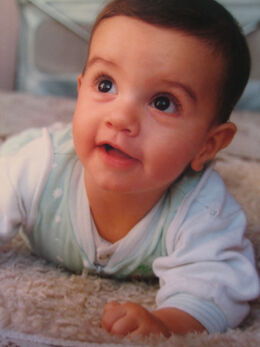Assessment |
Biopsychology |
Comparative |
Cognitive |
Developmental |
Language |
Individual differences |
Personality |
Philosophy |
Social |
Methods |
Statistics |
Clinical |
Educational |
Industrial |
Professional items |
World psychology |
Developmental Psychology: Cognitive development · Development of the self · Emotional development · Language development · Moral development · Perceptual development · Personality development · Psychosocial development · Social development · Developmental measures
Infant perception is an aspect of perceptual development and is the area of theory and research looking at the developmental psychology of perceptiual processess in infants
Auditory perception in the infant[]
- Main article: Auditory perception at birth
While still inside the mother, the infant could hear many internal noises, such as the mother's heartbeat, as well as many external noises including human voices, music and most other sounds. Therefore, although a newborn's ears may have some catarrh and fluid, he or she can hear sound from before birth. Newborns usually respond to a female voice over a male voice. This may explain why people will unknowingly raise the pitch of their voice when talking to newborns. The sound of other human voices, especially the mother's, can have a calming or soothing effect on the newborn. Conversely, loud or sudden noises will startle and scare a newborn.
Gustation in the infant[]
- Main article: Gustation in the infant
Newborns can respond to different tastes, including sweet, sour, bitter, and salty substances, with a preference toward sweets.
Olfaction in the infant[]
- Main article: Olfaction in the infant
A newborn has a developed sense of smell at birth, and within the first week of life can already distinguish the differences between the mother's own breast milk and that of another female.
Proprioception in the infant[]
- Main article: Proprioception in the infant

As an infant's vision develops, he or she may seem preoccupied with watching surrounding objects and people.
Newborns can feel all different sensations, but respond most enthusiastically to soft stroking, cuddling and caressing. Gentle rocking back and forth often calms a crying infant, as do massages and warm baths. Newborns may comfort themselves by sucking their thumb, or a pacifier. The need to suckle is instinctive (see Suction in biology) and allows newborns to feed.
Vision in the infant[]
Newborn infants have unremarkable vision, being able to focus on objects only about 18 inches (45 cm) directly in front of their face. While this may not be much, it is all that is needed for the infant to look at the mother's face when breastfeeding. When a newborn is not sleeping, or feeding, or crying, he or she may spend a lot of time staring at random objects. Usually anything that is shiny, has sharp contrasting colors, or has complex patterns will catch an infant's eye. However, the newborn has a preference for looking at other human faces above all else. (see also: infant metaphysics)